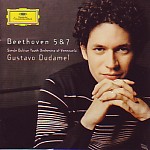For decades I have been singing the praises of Venezuela’s Orquesta Sinfonica Simón Bolívar, mainly for its excellent performances of Latin American music on the now defunct Dorian label, but this release was not a smart idea. It’s even weirder that this coupling should be appearing on DG, an imprint virtually synonymous with excellence in Beethoven interpretation and already sporting recordings of one or both symphonies by the likes of Furtwängler, Böhm, Bernstein, Fricsay, Karajan, Jochum, Giulini, Kleiber, Abbado, and countless others. Perhaps the best thing to be said for it is that Gustavo Dudamel, the putative reason for this issue in the first place, does a better job than Christian Thielemann– but then, doesn’t everyone? These are, in fact, respectable efforts, but they are by no means outstanding, and there is no reason on earth why you need to hear them.
First the orchestra: it plays well, but still isn’t a world-class group, at least in Beethoven. The horns are notably weak in the Seventh Symphony’s first movement and finale, timpani boom, trumpets lack incisiveness, and the strings overwhelm the woodwinds. Dudamel delivers competent interpretations that are exciting when the music is fast and loud (outer movements of the Fifth), and dull, even mannered, when the music becomes soft. The excessive fussiness and legato at the opening of the slow movements of both symphonies robs Beethoven of his necessary rhythmic impetus, and the islands of quiet in, for example, the finale of the Fifth tend to lose tension. In this respect Dudamel still has one very amateurish habit, best summarized as “loud equals fast, soft equals slow.” Hopefully, he’ll grow out of it. On the plus side, both scherzos go splendidly, that of the Seventh light and springy, and just listen to those lower strings in the trio of the Fifth! In the finale of the Seventh, Dudamel opts for speed at the expense of detail and clear articulation; the actual melody is hardly discernable in the blur, and the energy of the opening is only fitfully sustained. For what it’s worth, Dudamel ignores repeats in both finales.
Part of the problem may stem from the somewhat cloudy sonics that DG gets from the Aula Magna at the City University of Caracas. The space gave Dorian no end of trouble, but they managed brilliant results nonetheless (I know, I was there for one of their last sessions). But in the final analysis, here is yet another release in which we are asked to care more about non-musical criteria, in this case being offered an invitation to gape at the spectacle of an up-and-coming young conductor at the helm of an orchestra comprised of talented kids. That they have this outlet for their gifts is lovely, but there’s also something faintly patronizing about the whole enterprise, as if we should be surprised or amazed that the impoverished masses of Latin American can play classical music so well. Give me a break!
In reality, there is absolutely nothing special these days in seeing a group of well-drilled teens and young adults playing these works adequately, wherever they come from, whatever their backgrounds, whether they are Barenboim’s mix of Israelis and Palestinians, or poor kids from Venezuela. Neither provenance justifies a major label release of standard repertoire, absent extraordinary results. Dudamel’s rationale in the booklet notes for recording Beethoven amounts to “Why not? We can do it too.” Yes, they can, but that’s no reason why you need to rush out and purchase it. How much more interesting would it have been to hear music by some worthy Venezuelan composers, instead of having to make the inevitable comparisons in which Dudamel and his orchestra unsurprisingly come up short.
































